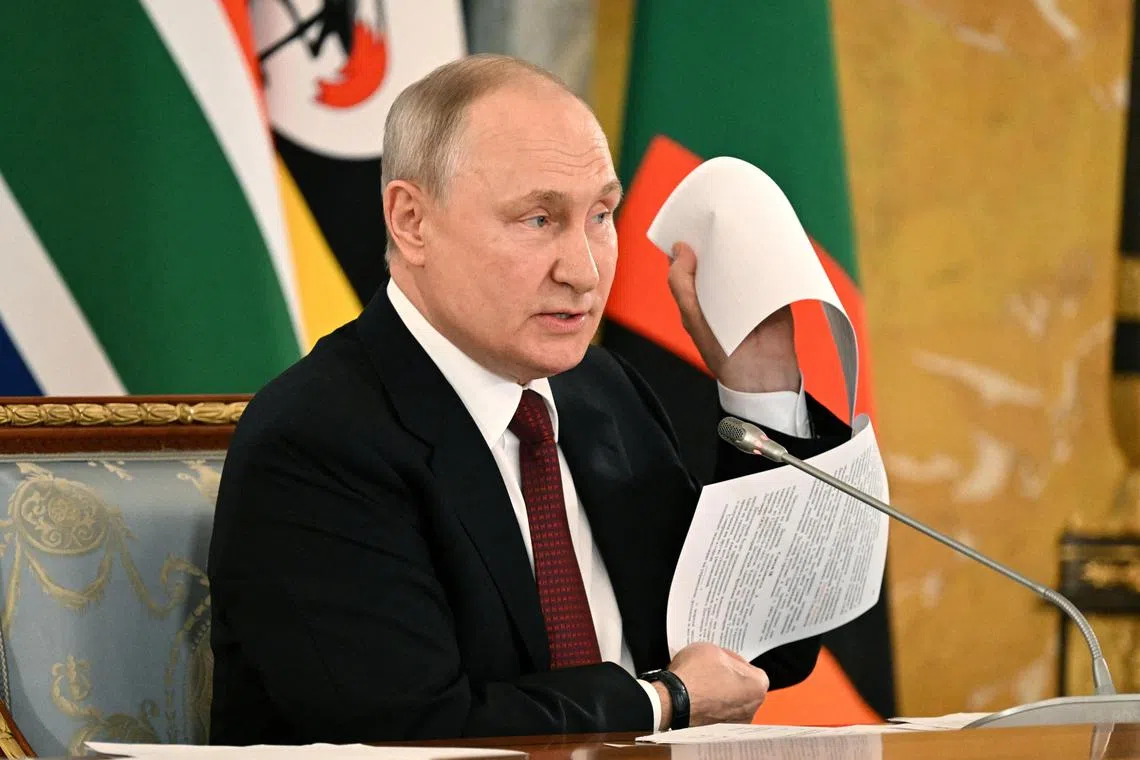Russia’s Putin lectures African leaders seeking to mediate in Ukraine
Sign up now: Get ST's newsletters delivered to your inbox

Russian President Vladimir Putin attends a meeting with a delegation of African leaders to discuss their proposal for peace talks between Russia and Ukraine.
PHOTO: REUTERS
MOSCOW - Russian President Vladimir Putin on Saturday gave African leaders seeking to mediate in the war in Ukraine a list of reasons why he believed many of their proposals were misguided, pouring cold water on a plan already largely dismissed by Kyiv.
The African leaders were seeking agreement on a series of “confidence building measures”, even as Kyiv last week began a counteroffensive to push back Russian forces from the swathes of southern and eastern Ukraine that they occupy.
Ukrainian President Volodymyr Zelenskiy said after meeting them in Kyiv on Friday that peace talks would require Moscow to withdraw its forces from occupied Ukrainian territory, something Russia has said is not negotiable.
Mr Putin opened Saturday’s talks with representatives of Senegal, Egypt, Zambia, Uganda, Congo Republic, Comoros and South Africa in a palace near St Petersburg by stressing Russia’s commitment to the continent.
But after presentations from the Comoran, Senegalese and South African leaders, he stepped in to challenge the assumptions of the plan before the round of comments from all the representatives could go any further.
Mr Putin reiterated his position that Ukraine and its Western allies had started the conflict long before Russia sent its armed forces over the border in February last year, something they deny.
He said the West, not Russia, was responsible for a sharp rise in global food prices early last year.
He told the delegation that Ukrainian grain exports from Black Sea ports
He said Russia had never refused talks with the Ukrainian side, which had been blocked by Kyiv. Moscow has, however, repeatedly said any peace must allow for “new realities”, meaning its declared annexation of five Ukrainian provinces, four of which it only partially controls - a red line for Kyiv.
The African plan includes a call for all children caught up in the conflict
“We took them out of a conflict zone, saving their lives,” he said.
South African President Cyril Ramaphosa laid out the 10 points of the African initiative, after Comoros President Azali Assoumani, current chairman of the African Union, told Mr Putin: “We’ve come here to listen to you, and through you the Russian people, and encourage you to enter negotiations with Ukraine in order to put an end to the difficult ordeal.
“We gave ourselves this mission because, as Africans, unfortunately, we have had to manage numerous conflicts, and it’s through dialogue and negotiations that we have succeeded at resolving them.”
Ukrainian President Volodymyr Zelensky had said after meeting the leaders in Kyiv on Friday that peace talks with Russia would be possible only after Moscow withdrew its forces
He added that he could not understand what could be gained from the delegation meeting Mr Putin.
Russian Foreign Minister Sergei Lavrov said in televised remarks that Moscow shared the “main approaches” of the African plan, but Kremlin spokesman Dmitry Peskov was quoted by Russian news agencies as saying it was “difficult to realise”.
Mr Peskov said Mr Putin had shown interest in the plan and Russia would continue dialogue with the African countries.
Mr Lavrov said they had not brought the Russian leader any message from Mr Zelenskiy.
Mr Putin said Russia was “open to constructive dialogue with anyone who wants to establish peace on the principles of fairness and acknowledgement of the legitimate interests of the parties”.
However, Russia has said repeatedly that any settlement must take account of “new realities”, meaning its declared annexation of five Ukrainian provinces, four of which it only partially controls.
There was no immediate word on the bilateral talks that Ramaphosa, host of a summit in August featuring Brazil, Russia, India, China and South Africa, had said he would have with Putin.
Since the International Criminal Court indicted Putin in March on war crimes charges - which he rejects - South Africa, as a member of the court, finds itself in the awkward position of being obliged to arrest him if he sets foot there. REUTERS


